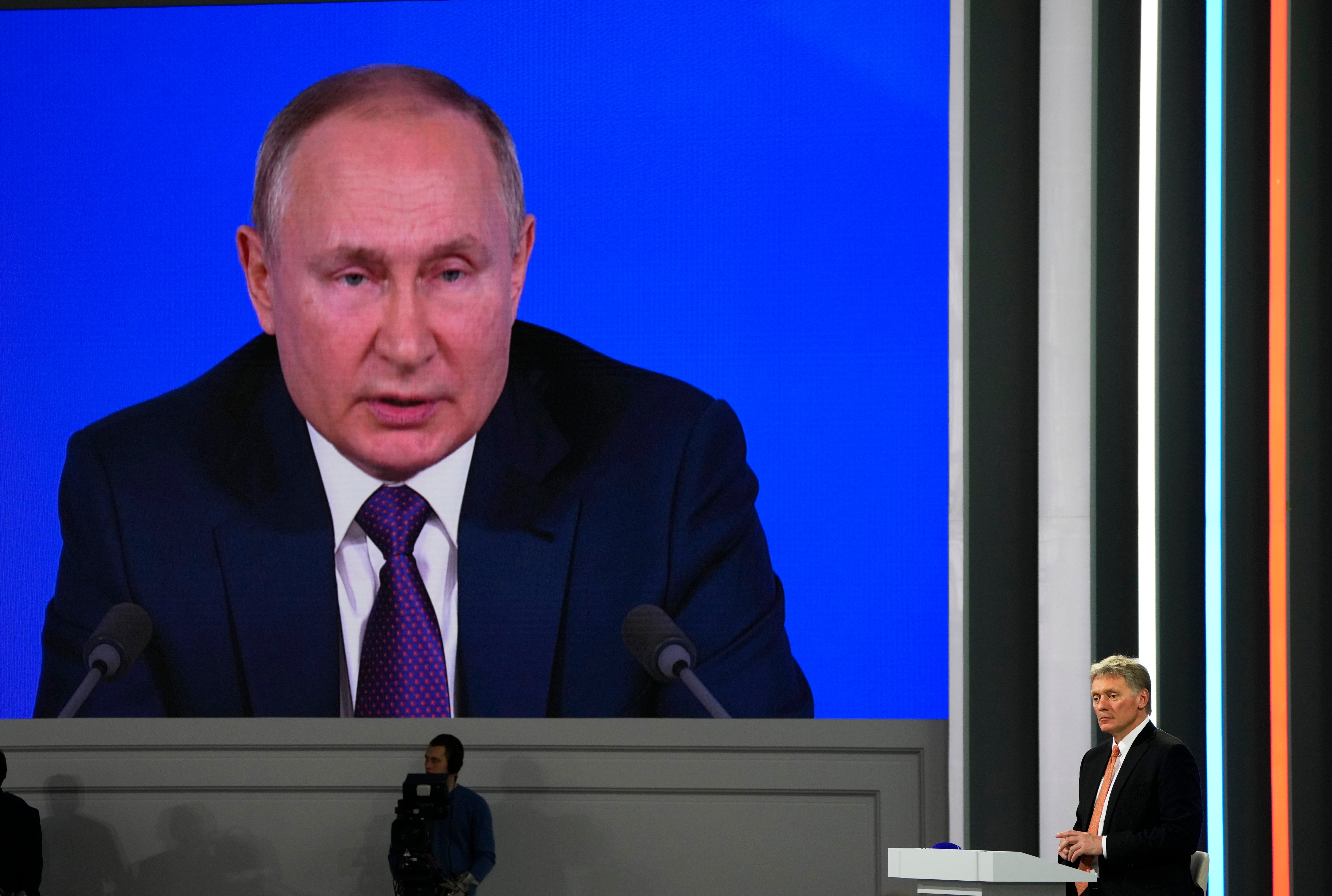Kremlin expects US answer on security guarantees next month
The Kremlin says it expects the U.S. to respond next month to Moscow’s request for security guarantees precluding NATO’s expansion to Ukraine

Your support helps us to tell the story
From reproductive rights to climate change to Big Tech, The Independent is on the ground when the story is developing. Whether it's investigating the financials of Elon Musk's pro-Trump PAC or producing our latest documentary, 'The A Word', which shines a light on the American women fighting for reproductive rights, we know how important it is to parse out the facts from the messaging.
At such a critical moment in US history, we need reporters on the ground. Your donation allows us to keep sending journalists to speak to both sides of the story.
The Independent is trusted by Americans across the entire political spectrum. And unlike many other quality news outlets, we choose not to lock Americans out of our reporting and analysis with paywalls. We believe quality journalism should be available to everyone, paid for by those who can afford it.
Your support makes all the difference.The Kremlin said Friday that it expects the United States to respond next month to Moscow s request for security guarantees precluding NATO's expansion to Ukraine
Russian President Vladimir Putin urged the West on Thursday to “immediately” meet Russia’s demand, accusing the U.S. and its allies of maintaining a military presence “on the threshold of our home.”
Last week, Moscow submitted draft security documents demanding that NATO deny membership to Ukraine and other former Soviet countries and roll back the alliance’s military deployments in Central and Eastern Europe.
“To discuss de-escalation, we expect our opponents in Washington to provide specific answers to our proposals in January,” Kremlin spokesman Dmitry Peskov said during a Friday conference call with reporters.
Moscow presented its demand amid soaring tensions over a Russian troop buildup near Ukraine that has stoked fears of a possible invasion. U.S. President Joe Biden warned Putin in a video call earlier this month that Russia will face “severe consequences” if it attacks Ukraine.
Russia has denied plans to launch an attack but has described a NATO expansion and weapons deployment in Ukraine as a “red line.”
During a marathon annual news conference on Thursday, Putin said U.S-Russia talks set to start in Geneva next month were a “positive” move, but he warned that Moscow expects the discussion to produce quick results.
However, the U.S. and its allies have said they won’t give Russia the kind of guarantee on Ukraine that Putin wants. A key principle of NATO is that membership is open to any qualifying country. American officials are conferring with European allies in advance of the Geneva talks.
Ukrainian Foreign Minister Dmytro Kuleba said Friday that his country must be part of any NATO security talks with Russia.
“Euro-Atlantic security is at stake in Ukraine, therefore, Ukraine should be part of security consultations on the matter,” Kuleba wrote on Twitter. “We support the idea of the U.S., the EU, NATO talking to Russia as long as the primary topic is ending the international armed conflict, Russia’s war on Ukraine.”
Kremlin spokesman Peskov rejected Western concerns about the Russian troop concentration near Ukraine, saying the country was entitled to deploy its military wherever it considers necessary on its territory. He presented the recent movements as a defensive response to provocations from the West.
He added that “it causes our deep concern and forces us to take certain measures to ensure our security.”
“Whatever Russia does with its troops, it does that on its own territory. and we can’t allow anyone to challenge that sovereign right,” Peskov said. “Russia takes certain action to move and redeploy its armed forces on its territory in view of unfriendly moves by our opponents from NATO - the U.S. and some European countries that have made some unambiguous maneuvers near our borders, conducted reconnaissance flights and deployed warships.”
Russia annexed Ukraine’s Crimean Peninsula in 2014 and shortly after cast its support behind a separatist rebellion in the country’s east. The fighting, which started more than seven years ago, has killed over 14,000 people and devastated Ukraine’s industrial heartland, known as the Donbas.
___
Yuras Karmanau in Kyiv, Ukraine contributed to this report.